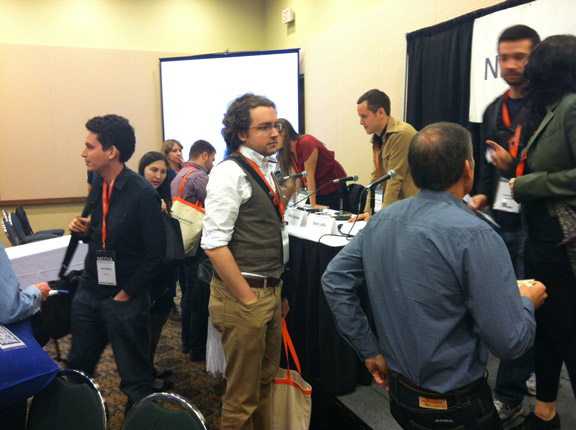So the other day I received this email shortly after an article I wrote appeared in RI Future (I’ve only edited it due to some sentence breaks:
Sam;
Publishing the contents of the OP discussion list serve on -line with links at RI Future blog is a violation of our safety/security policies.
Of course, anyone is free to criticize OP, publicly or on the list itself, but exposing the discussion list to the public is not acceptable.
Unfortunately, this is seen by OP as a serious infraction.of our rules for the list. We have had to ask members of the press to leave the list for that exact reason – they wouldn’t respect OP confidentially on its’ list..
We’re requesting that you remove yourself from the OP discussion list.
solidarity;
[Name Redacted]
Well, I’m a good sport, so I fired back this:
I’m sorry, I thought Occupy was committed to a higher level of openness and communication; you know, that the 99% should be able to see the 99%’s list. I’m sorry that’s not the case. Go ahead and remove me.
Sincerely,
Sam
Which lead to this reply that I’ve since sat on:
Sam; I hope this is just a misunderstanding. When people post to the OP discussion list, they have to have a certain level of trust that their posts will not be published in the [public] media (certainly not without their prior permission). That’s just common sense. In the past, people have been targeted by the government, employers (lost jobs), and been the subject of harassment for belonging to social protest movements like Occupy. For instance: there’s currently a war on public education, a war on women, and a war on the middle class, designed, engineered and promulgated by both parties – a broad austerity and state security agenda that we’re opposed to. We have teachers, students, and working people in our movement – people who could be targeted and hurt from exposure. In case you haven’t noticed, the US is not really a ‘free’ society anymore. Publishing the contents of emails from the OP list is wrong on so many levels and has nothing to do with any perceived ‘higher openness’. That’s not the same thing as publicly criticizing OP’s tactics or ideas. The right wing does that all the time and we’re perfectly capable of publicly defending our ideas and tactics, but we draw the line at intentionally opening up our people to potential harassment, intimidation, and reprisals. We don’t really want you to leave the list, but do need your promise that you will not publish or publicly expose posts, discussions, threads, etc.from the OP list. If you will make that commitment and agree not to in the future, we’re perfectly happy to have you stay on the list and participate in OP activity. If you feel that you can’t agree to this, then we will have to agree to disagree and you will be removed.
There’s a lot to unpack in that statement. There’s a lot I agree with. I mean, honestly I didn’t need to share this list. As long as I could quote people (even if it’s anonymously) Occupy Providence benefits. The more I can see and read what they’re thinking, the more they benefit. And I’m with the writer on a number of points; austerity is the best example.
But there’s a lot I disagree with here. First, that the United States “is not really a ‘free’ society anymore.” I disagree. That’s a philosophical, personal disagreement, but I think the experience of Occupy sort of proves that. Police have not been hunting down its members. Occupy members have not been disappeared. Certainly, many were infiltrated by police, and the Department of Homeland Security was involved in coordinating crackdowns. But frankly, if police officers are competent, the police already have the names of everyone who ever signed on to Occupy Providence’s email list (enough people were getting those initial emails that it seems impossible to maintain security. Besides which, Occupy Providence ended with a negotiated decampment when the city was within its legal rights to forcibly clear it away.
The other thing is this break from the past and even from the present. This large disconnect about civil disobedience. Occupy often claims to draw inspiration from sources as varied as the Civil Rights Movement or the Arab Spring. But what it reminds me of is Take Back NYU. If you don’t remember it, or haven’t heard about it,
here’s the embedded student reporter giving his thoughts after it ended. There’s also a good
“7 Errors” post. From the slogans (e.g., “Occupy Everything”) to the tactics, to the organization, TBNYU is far more Occupy’s predecessor than any Arab Spring Revolution or Civil Rights Movement.
In the past, yes, social movements have been subjected to government and private harassment, intimidation, and reprisals. But you know what: they faced those down. Otherwise,
this doesn’t happen. Or
this. Or
this (warning: contains filmed murder). See, a social movement lays down its life in pursuit of a higher goal. In fact, every time an act of intimidation happens, you protest it. If a member is fired due to their political beliefs, you go and protest their workplace and draw attention to it. If government harasses your members, you protest the department harassing them. Or you
do something drastic.
You also have to be protesting the right thing. The day after 38 Studios went bankrupt and the state announced a criminal investigation, I went and visited the Occupy table to learn if they meant literal “bailout” or if they meant paying back the loans. A protestor assured me that it was a bailout situation, and that Governor Lincoln Chafee was completely behind a bailout and had indeed wanted to bring 38 Studios to Rhode Island. News, I’m sure, to the Governor, who is on record
opposing both the initial deal and
any potential bailout. The other “protestor” didn’t know what we were talking about.
If Occupy Providence wants to eject journalists from reading its listserv, alright. Privacy is fine and good. But don’t expect me to sympathize with your members who are protesting social injustice if they don’t understand they’re going to be subjected to that injustice. Every time I write for RI Future, I make a decision; is speaking my mind more important than protecting my ability to be hired or to do a job? I’ve always said “yes, it is.” I’m fortunate enough to have an employer that respects that. But there is no guarantee that in the future I won’t be applying to jobs where the people don’t respect that; where my well-broadcast opinions will become liabilities. I’ve made that decision, and I understand that there is no possibility of going back.
Every time we go out into the public square to protest, we are making a statement: my individual fate is nothing compared to the fate of my friends, family and the society in which I live, and I accept the consequences of these actions. Those who try to mitigate this statement by attempting to shield themselves from the consequences create dying movements. Those who have the integrity to embrace it embrace a better future.



